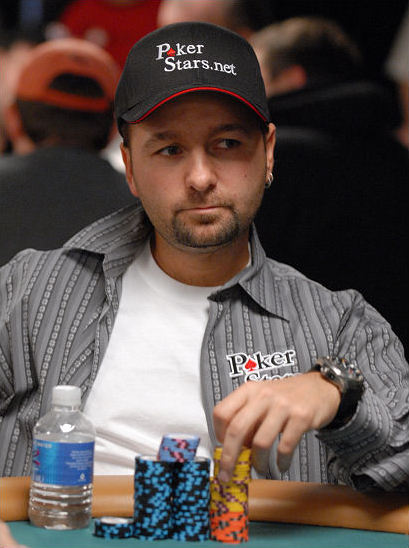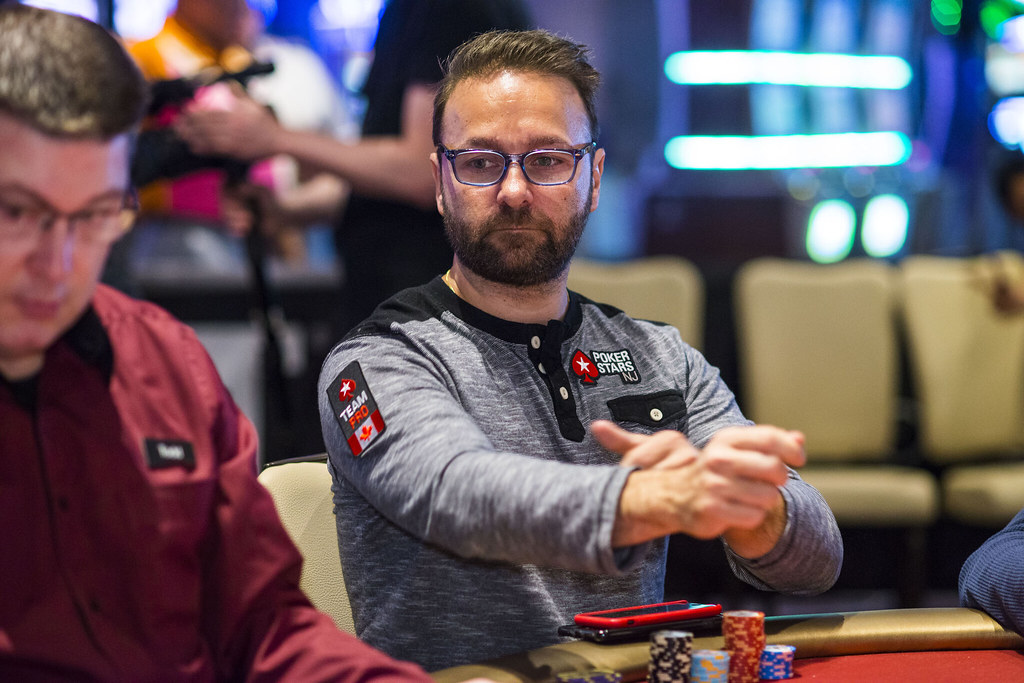Welcome, readers, to the rebirth of the fabled Kick Ass Poker Blog, where we begin our second generation of chat about all things poker with a look inside the tale of Daniel Negreanu and his proposed changes to the World Series of Poker’s annual Player of the Year chase.
The POY race has always been of significant importance to Kid Poker. Given his prominence and large, dedicated fan base, that makes it a topic for a large swath of the poker world. Along the way, we’ll also touch on the discovery of the data-entry error that temporarily (but erroneously) named Negreanu as the 2019 WSOP POY winner. Five days later, upon discovery of the error, the award was re-designated to the rightful winner, Australia’s Robert Campbell.

Now, on to the disclaimers. I have done some work for the World Series of Poker in recent years as a freelance, third-party contractor. I have some limited general knowledge as to the formula used to compute POY points, but I have never had any input on that formula’s creation. I also have no direct knowledge on how results are transcribed from the cashier part of the WSOP’s system and then translated into POY points.
I am, however, aware that the running update to the POY leaderboard takes place overnight each night, roughly between 3 and 4 am Vegas time. (By the way, the updated totals have never been “days” late, as Allen “Chainsaw” Kessler opined recently on social media. I like Allen, but he’s just wrong on that point.)
Anyway, all this is just to notify all readers that any opinions on these topics are mine and mine alone, and they have no association with the WSOP or with Caesars. So, moving on….
Negreanu’s proposals address perceived system shortcomings
No matter how the POY points system is constructed, some players will always find fault with it. I have been told that the math behind the system is very sound, and I believe that. I also agree with the general poker-world consensus that the points system as it exists today is a significant improvement over the way points were awarded several years back.
Negreanu, though, is an agitator and prodder, consistently pushing to make the award conform to his ideal of what the POY honor should represent. (Unfortunately, his ideals have always been somewhat malleable, based on what suits his purpose, but that’s another tale.) Suffice it to say, though, that the POY award has always been of outsized importance to Negrenau, and he’s been outspoken on the topic for many, many years.
That Negreanu was involved in the 2019 points-calculation snafu is just an unfortunate coincidence in all this. Let’s excerpt from Negreanu’s broadly-read blog post in the wake of the 2019 POY blunder, in which he summarized some of the many changes he’d like to see to the POY rules on Twitter.
Negreanu wrote this:
I’ve been the most vocal about fixing this system for years, and to their credit, they did make some adjustments to improve it. Specifically, giving a lot more weight to wins which count for double the points you get for second. This makes it a lot more difficult to win POY without winning a bracelet, and I think that’s a good thing. For example, two second place finishes would get you the same amount of points as one win. Obviously it’s more difficult to get heads up twice than it is to win once, but someone who wins multiple bracelets should be rewarded handsomely in terms of POY points.
I’ve discussed several of my ideas to improve the system on Twitter, but here are the cliffs:
- Limit the number of cashes that count towards your total to 12. This gives more people a chance to win POY and focuses on quality over quantity. It no longer incentivizes people to chase min cashes down the stretch.
- Decrease the value of a min cash in mutlti-heat, large field reentry events. It is not an accomplishment to cash in Colossus when you have 9 heats with a reentry in each.
- All min cashes should not be treated equally. A min cash in a 3000 player field is much easier than a min cash in a 100 player field 10k buy in mixed event. It’s significantly harder to cash in the latter, while the former is hardly an accomplishment at all, especially when you are paying 15% of the field.
- Decrease the main event points awarded. You would still make this the premier event when it comes to points and get a ton, just slightly less than you do now. This is important when decreasing the number of cashes that count.
- Divide points by number of entries. If you play in an unlimited reentry event and use 4 bullets, your point total should be divided by 4. So for example, lets say you win an event that would get you 1000 points, but rebought three times. Now, you would get 1000/4 for 250 points. I’m less invested in this one, but many people seem to feel strongly about this one.
Just to illustrate Negreanu’s fluidity on these points, in 2018, on the same topic, he wrote this:
- Limit Cashes to the best 8- To win player of the year you are going to have to play 20+ tournaments so 8 cashes with 15% of the field getting paid is more than reasonable. Capping the number of cashes that count ensures that the cashes being used are all quality scores and also limits the advantage players who double dip in tournaments and play the full schedule have. That’s good for the average Joe. If he strings together some big scores in the smaller events, that accomplishment isn’t negated by a ton of insignificant min cashes that are inevitable for players playing 50+ events. If you play 50 events, you rate to cash about 10 times even in a bad year.
- Min Cash to Win ratio at 8-1- In a 600 player field, the current system rewarded the winner the equivalent of 4 min cashes. That’s not a good ratio. A ratio closer to 8-1 seems a lot more fair. When creating the formula you can embed this once you have decided what a win is worth. If a win is worth 100 points, a min cash could be something like 12 points sliding up as you progress to the final table where you can create another formula that looks something like:
Win 100 points
2nd 75% of 1st place points
3rd 65% of 1st place points
4th 60% and so on….
- Value the $10ks buy in events higher- It is much tougher to cash in a 100 player field in a $10k event than it is to cash in a large field event that pays hundreds of spots. It takes roughly 3 times more play, the structures are slower on day two, and you are also fighting against top notch competition in the Championship events when you near the bubble. It often takes 3-4 hours to go from 23 to 20 players. These events should be special since the strength of field on average is going to be special.
- Field Size Cap of 8000- The outlier in the 2017 system is definitely the Colossus which has multiple re-entries that bloats the field size as high as 20,000. A win in this event should absolutely be weighted heavily, but the min cash shouldn’t be given much weight. By capping the field size it becomes less distorted within the system.
- Must Win a Bracelet- This one might be controversial, but I like it. We have never had a POY winner that didn’t win a bracelet, but that is very possible this year. I don’t think it’s unreasonable to require at least one win to be rewarded POY. In fact I think it adds a cool dynamic to the race. You may have a points leader at the top without a bracelet who in the homestretch needs that win to win the title. Yes, I’m aware that this would exclude me from contention in the 2017 race, but it isn’t about me, it’s about a system that absolutely guarantees the ultimate winner will be deserving.
“Deserving,” in Negreanu’s eyes, has always meant demonstrating skill in poker variants other than no-limit hold’em and PLO. I don’t disagree with that rationale, being a fan of mixed games myself, but I do note that it automatically predisposes the POY chase to value those games more highly than the basic hold’em and Omaha games.
Separating wheat from chaff
That’s a form of bias and skew, and, historically speaking, it’s how the skillful Negreanu frames these arguments to better get his way. Speaking as a devil’s advocate, I agree that players who excel at more formats are better overall players. However, the POY award should be a measure of overall results, rather than an assessment of broadness of one’s poker skill set.
Let’s move on; there are larger fish to fry. Perhaps the most important element in the changes Negreanu would like to see is a cap on the number of WSOP cashes that count toward the annual award. In 2018 he said eight, this year he’s said 12, but the fact is, he wants a limit.
Remember earlier that I noted that the WSOP’s POY scoring system is based on sound math? There’s one premise to be added to that, and that’s the math is very sound, if one gives the min-cash points the same importance as… well… actually min-cashing in an event. That’s a stand-alone value consideration.
Though we often think of such results as just a min-cash, and they are usually disappointing, they are a key value moment in any tourney. Surviving into the money is the difference between winning nothing and not only locking up a small profit, but continuing on for a chance at a big payday.
Negreanu argues for a cap on cashes that count toward the POY, which is a way of eliminating some of the min-cashes. He also argues that each min-cash is overvalued in terms of POY points and should be lowered.
I think that it should be one or the other, but not both. I’ll also opine that the cap is the better solution, not the reduction of a min-cash’s relative importance, because getting past the bubble is important in and of itself. I also think that a lower number, eight or ten, is better than 12. The reason: The POY award should lean towards excellence rather than consistency.
Yet there’s another factor to consider amid all this. I believe a lot of the enmity toward the whole POY points thing comes from Chris Ferguson pirating the 2017 POY honor, then using the same tactics in 2018 and 2019, though without the same success. Ferguson’s tactic has been to “max late-reg” a given event, literally trying to be the last person to receive chips and be assigned a seat. This even means Ferguson getting into the seat-assignment line and then letting people who arrive even later go ahead of him. The tactic isn’t illegal, but it is an angle, of a type not familiar to the casual poker fan.
It also contributes to the bad blood between Ferguson and other people who see the POY chase a little differently. Negreanu has also been highly outspoken about his dislike for Ferguson and Ferguson’s prior FTP escapades, and that’s not going away soon.
Perhaps one of the most intriguing points among Negreanu’s POY proposals is the idea of dividing the number of points awarded to an individual by the number of total entries and re-buys that individual made in that tourney. Such a rule conceivably could have a very tiny negative impact on one or two POY chasers giving it up in a certain event, meaning the loss of a buy-in or two among thousands to the WSOP coffers. However, I really like this idea. Again, the POY award should be about performance and excellence, not the financial ability to keep on buying more chips.
I’m rather against Negreanu’s idea of giving even more weight to the $10,000-and-up events. The POY formula already gives significant weight to the buy-in itself, and the impact is such that in any given year, perhaps only 30 players have a realistic shot at earning the POY honor. Jacking up the buy-in component even higher would trim that number even farther, and it’s already a contest of the elite. I get that those elites love seeing their banners in the rafters, but, it’s skewed enough that way already.
The 2019 POY Snafu
I haven’t opined anywhere on the 2019 POY mess, in which a data-entry error temporarily affected the outcome. I don’t know exactly how the data is translated over to the POY program, though that compilation worked properly. The problem was that some data was entered improperly, duplicating 15 results from one event into another.
It was likely a copy-paste error of some sort. I have no idea whodunit, and I really don’t care. Mistakes happen. It was just an unfortunate happenstance that this error, affecting only 15 erroneous entries, just happened to include a player involved in the tight POY chase.
At least there weren’t major prizes involved, as would have been the case in 2017 and earlier.
I also saw the heated accusations made by another of the POY leaders, Shaun Deeb, that Negreanu must have known he’d received over 200 extra points.
Deeb did himself no image favors with the tone of his attacks, though as someone who’s talked to him a few times, I can say that that’s literally just Shaun. He has no “tact” filter; he shoots straight from the hip, quickly, and without much thought as to how what he says or writes will be received. Actually, he doesn’t care all that much. I can sort of appreciate (and envy, a bit) that.
Still, such accusations as he made were harsh and filled with supposition. On the one hand, my experience is that players high on the board in these races tend to track their results very closely. I also have to give some credibility to the flip side: Had Negreanu been shorted a couple of hundred points for any length of time, it’s hard to believe he wouldn’t have noticed.
Yet I am a very cynical, jaded sort, so factor that in as well. Negreanu said he wasn’t tracking the points as closely as many would have expected. Given that there’s no evidence to the contrary, the poker world must take Kid Poker at his word. Thus, congrats to Campbell for being the player who’ll be on the 2019 POY banner, even if it took some extra time and effort to sort it all out.

